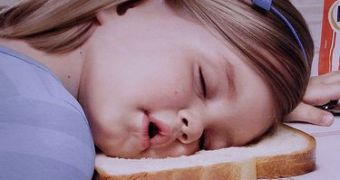A new research carried out by the University of Pennsylvania School of Medicine in Philadelphia, found out why some people only sleep a few hours at night and burst with energy and others can hardly function after an eight-hour sleep – it's all about genes.
The team led by Namni Goel, PhD, looked at people who have a gene variant that is related to narcolepsy (a sleep disorder or dyssomnia, characterized by excessive daytime sleepiness).
People having the DQB1 *0602 gene variant, will not automatically develop the sleep disorder, and, depending on the population, between 12 and 38 percent of them are actually considered to be healthy sleepers.
There are also individuals without the gene variant that can develop narcolepsy, though this is rather rare.
For their research, the scientists compared 92 healthy adults without the gene variant, to 37 healthy adults who had the gene variant but did not have any sleep disorders.
The experiment took place in a sleep laboratory, and for the first two nights, all of the participants spent 10 hours in bed and were well rested.
For the next five nights, they experienced chronic sleep deprivation or sleep restriction, as they were only allowed to sleep for four hours a night.
The rest of the time the lights were kept on and the participants could play games, read or watch movies, in order to stay awake.
This was necessary so that the researchers could measure the participants' sleep quality, their self-rated sleepiness, their attention, their memory and ability to not fall asleep during daytime.
What they found was that people with the DQB1*0602 gene variant were sleepier and more tired than others, even when they were fully rested, because their sleep was more fragmented.
They woke up on average nearly four times during the fifth night of sleep restriction, unlike those without the gene variant, who only woke up twice, and also had a lower desire to sleep during the fully rested nights.
This gene variant seems to cause a lot of problems, as people having it also spend less time in deep sleep that others, regardless of the sleep time: during the second 10-hours night, they had an average of 34 minutes in stage three sleep, unlike 43 minutes for those without the variant; and during the 5th night of sleep deprivation, they spent an average of 29 minutes in stage three sleep, compared to 35 minutes for others.
On the other hand, both groups had equal performances at the memory and attention tests, and there was no difference in their ability to stay awake during daytime.
Goel concluded that “this gene may be a biomarker for predicting how people will respond to sleep deprivation, which has significant health consequences and affects millions of people around the world.
“It may be particularly important to those who work on the night shift, travel frequently across multiple time zones, or just lose sleep due to their multiple work and family obligations.
“However, more research and replication of our findings are needed.”
This new research along with an accompanying editorial, were published today in the print issue of Neurology, the medical journal of the American Academy of Neurology.

 14 DAY TRIAL //
14 DAY TRIAL //